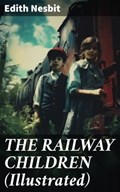In "The Railway Children," Edith Nesbit crafts a timeless tale that intertwines adventure, familial love, and social justice against the backdrop of Edwardian England. The narrative follows the lives of three children'—Roberta, Peter, and Phyllis'—who move to a countryside cottage after their father is wrongfully imprisoned. With a blend of whimsical storytelling and poignant social commentary, Nesbit explores themes of resilience and community through the children's encounters with the railway workers and their efforts to uncover the truth behind their father's plight. The book's illustrated version enhances its charm, vividly capturing the enchanting world of childhood and the picturesque setting, making it accessible and engaging for contemporary readers. Edith Nesbit, a pioneer in children's literature, was deeply influenced by her own childhood experiences and her convictions in socialism. As a co-founder of the Fabian Society, Nesbit infused her narratives with advocacy for social reform, particularly in illustrating the stark contrasts between class divisions. Her background in literature and her active involvement in progressive movements provided the fertile ground from which "The Railway Children" emerged, reflecting her desire to inspire empathy among her young audience towards societal issues. This classic literary work is highly recommended for readers of all ages, particularly those who cherish stories that celebrate the triumph of human spirit and the importance of family bonds. Nesbit's skillful narrative and her ability to seamlessly weave moral lessons into an engaging adventure make it a quintessential text in children's literature, deserving of a place on every bookshelf. In this enriched edition, we have carefully created added value for your reading experience: - A succinct Introduction situates the work's timeless appeal and themes. - The Synopsis outlines the central plot, highlighting key developments without spoiling critical twists. - A detailed Historical Context immerses you in the era's events and influences that shaped the writing. - An Author Biography reveals milestones in the author's life, illuminating the personal insights behind the text. - A thorough Analysis dissects symbols, motifs, and character arcs to unearth underlying meanings. - Reflection questions prompt you to engage personally with the work's messages, connecting them to modern life. - Hand-picked Memorable Quotes shine a spotlight on moments of literary brilliance. - Interactive footnotes clarify unusual references, historical allusions, and archaic phrases for an effortless, more informed read.

